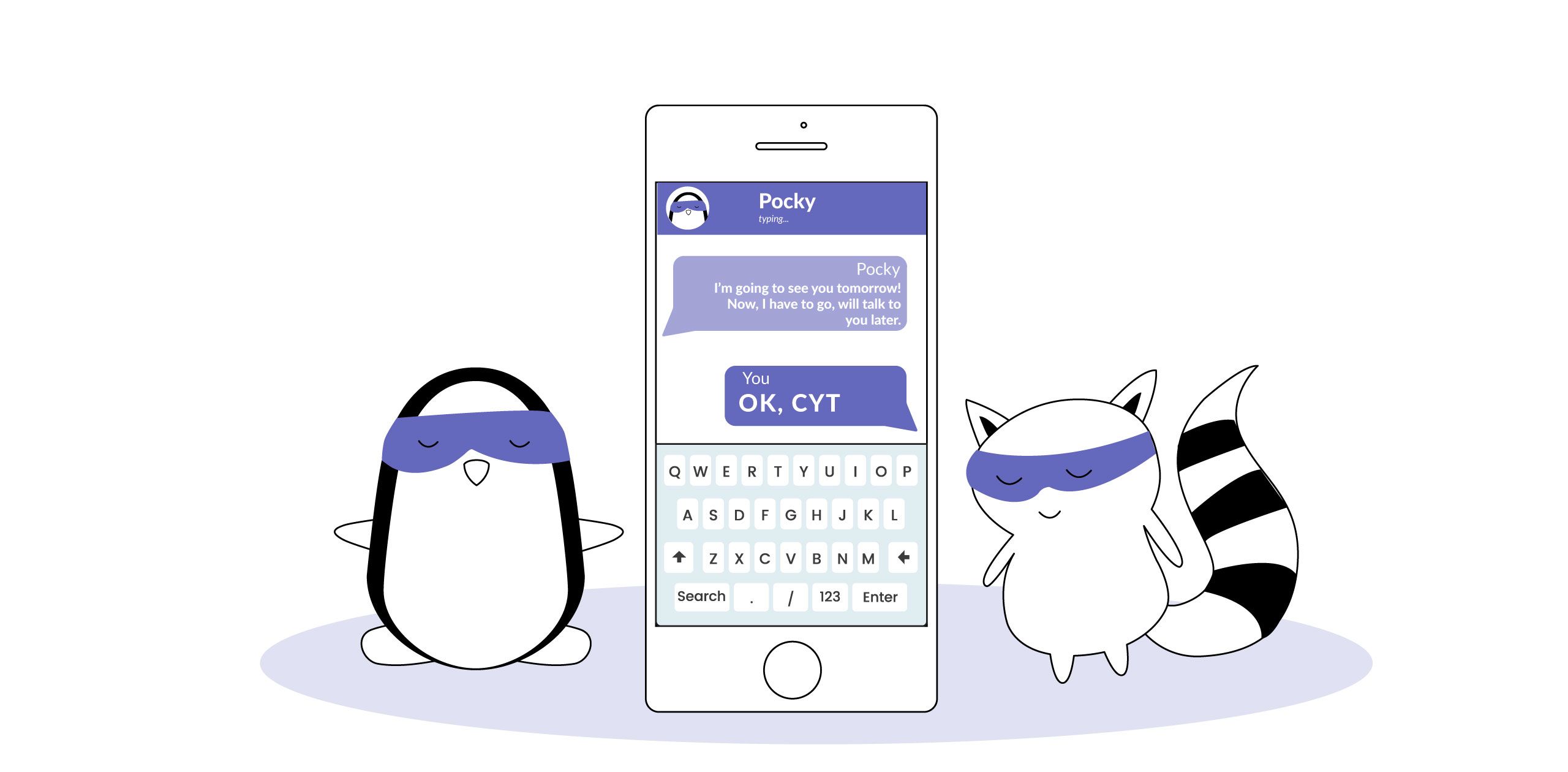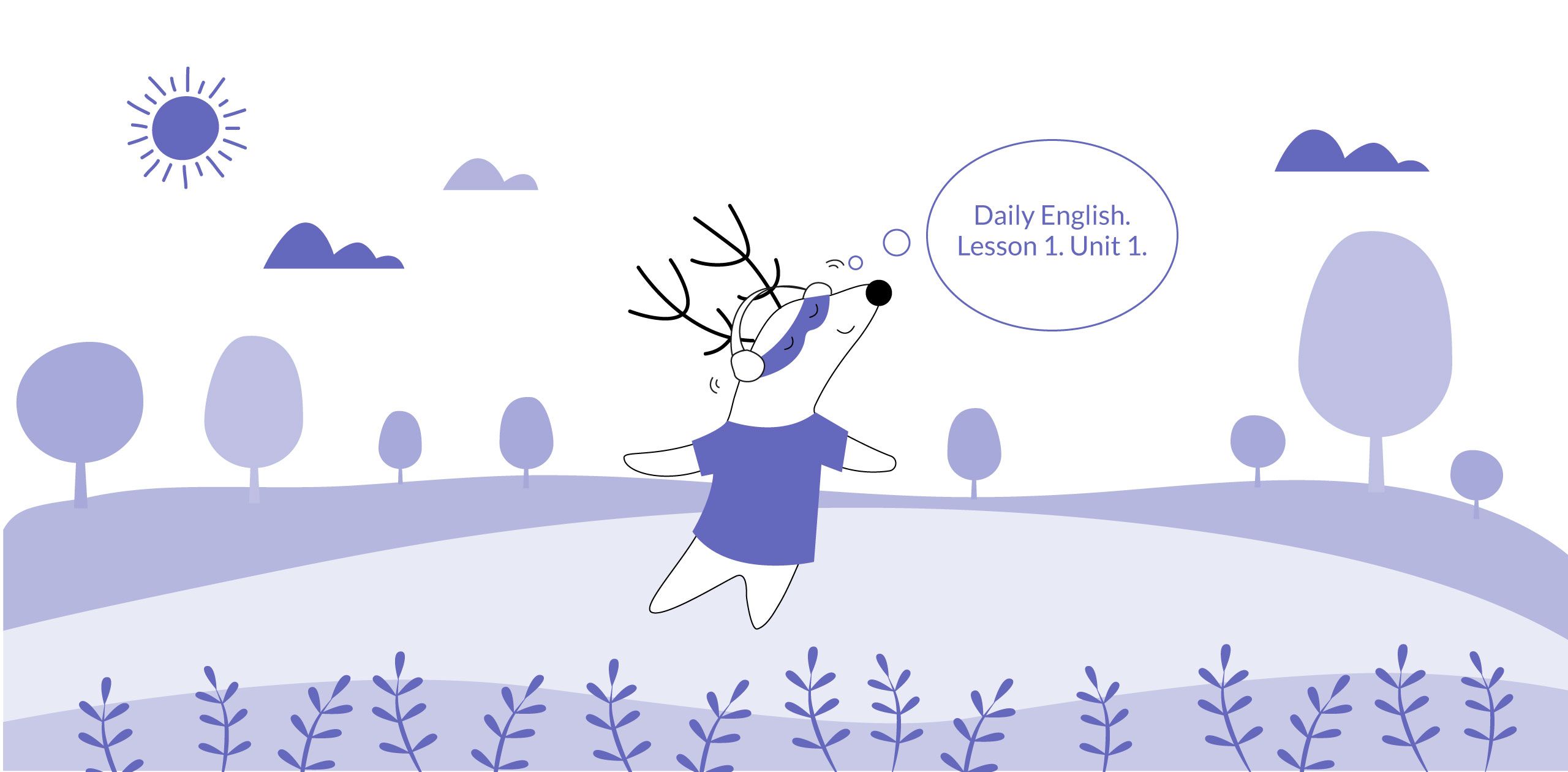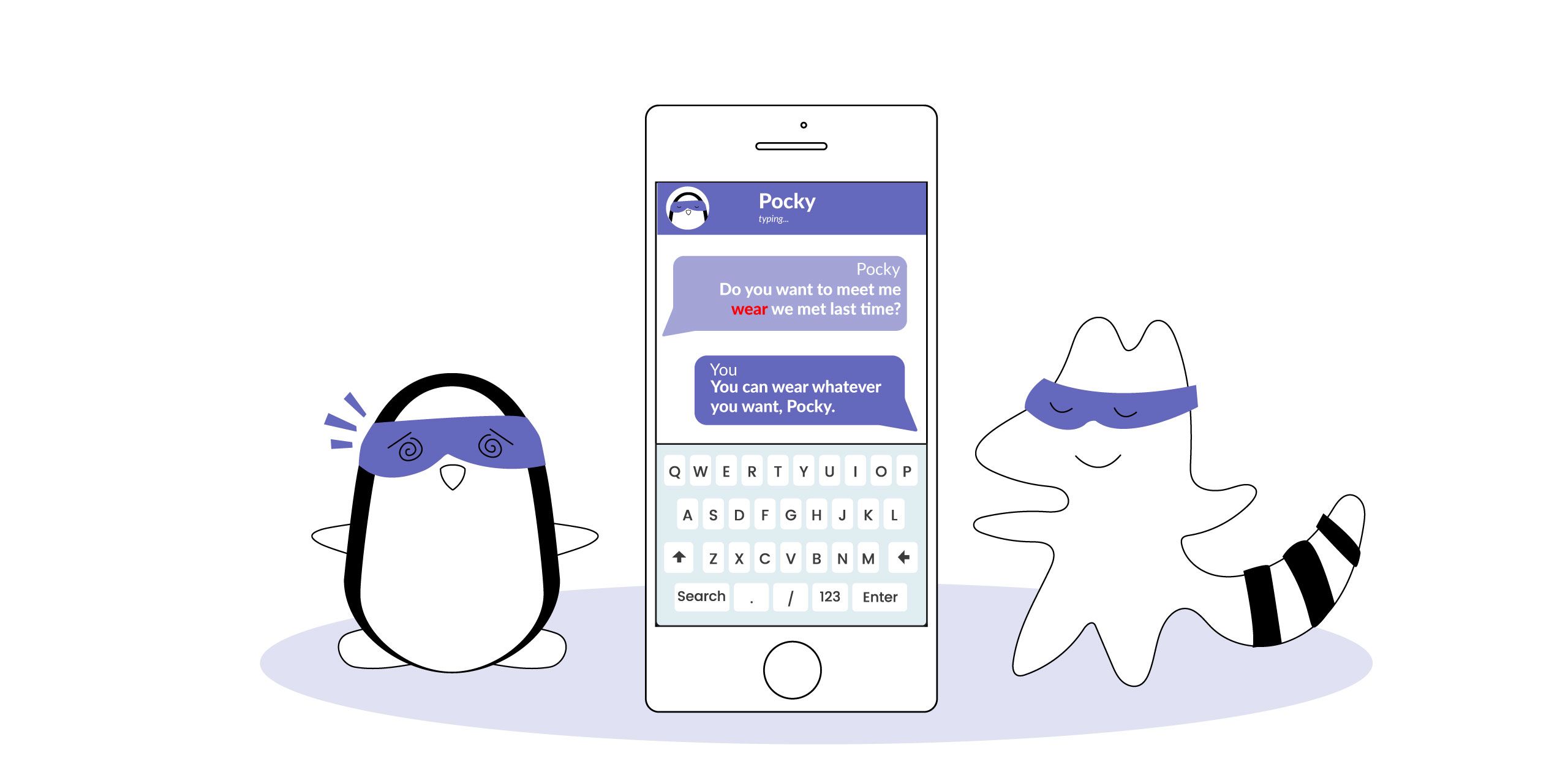
Although not all English tests or exams have dedicated exercises to check your spelling, your spelling is still being evaluated. Furthermore, misspelled words are frequently considered errors in tests, which lowers your overall score even if you wrote the correct answer.
This is why it is important not only to choose the right word but also to be able to write it correctly. Moreover, a text full of spelling mistakes that affect its meaning will not only look less professional but might also slow your growth when you need to submit enrollment essays or job applications.
There are several reasons for spelling mistakes in the English language - from typos and long words that are difficult to remember to unfamiliar proper nouns and the use of apostrophes. However, errors are most frequently caused mainly by incorrect use of homophones and differences in American and British English. Let's take a closer look:
Homophones
There are hundreds of examples of homophones in English - two words (or more) that sound the same but have different meanings and have different spellings. Because they have different meanings, using the wrong word in a sentence will change its meaning or simply sound like nonsense.
Incorrect use of homophones is a common mistake, both among native English speakers and English learners. What's more, the only way to avoid misspelling when dealing with homophones is to know a word's exact meaning and use it accordingly. Let's take a closer look at the most commonly misspelled homophones in the English language:
Carmel vs. Caramel
"Caramel" is a common noun that comes from the French word caramel, which means "burnt sugar." There is also caramel candy - sweets with a chewy texture that contain sweetened condensed milk and corn syrup. The word "caramel" has three syllables: car-a-mel; however, there isn't one correct pronunciation because of the differentiation of accents.
The most common pronunciations include karr-uh-mel, karr-uh-muhl, kar-e-mel (with emphasis on the first syllable), and, frequently used by North Americans, kar-muhl. The disappearance of the second syllable in how North Americans pronounce "caramel" is one of the factors why this word is frequently pronounced "carmel" and misspelled.
In contrast, "Carmel" is a proper noun with only two syllables: car-mel and pronounced kar-mel. So, it isn't just a misspelled version of the word "caramel," but a different word.
When to Use Word Caramel
When it comes to using "caramel" in writing, it is essential to realize that this word itself can have several various meanings. Here are the examples:
- To describe a sweet glaze made by cooking sugar until it turns brown, used to add flavoring or coloring to sweet food: Tomorrow, my mom will show me how to make my favorite sweet treat - salted caramel apples.
- To describe a light brown color: I have always dreamt about a stylish caramel-colored trench to wear in autumn.
- To describe a chewy candy, such as toffee made of butter, sugar, and milk, a hard candy, or any other caramel-flavored candy: I would die for a coffee and a few caramels right now.
You can also create a verb form - to caramelize - to describe the process of heating sugar or cooking something until it develops a characteristic brown color:
- I will caramelize onions before adding them to my burger to enhance the taste.
- You can make caramelized sugar at home, in a microwave.

When to Use Word Carmel
The proper name "Carmel" is most frequently used to name geographical locations. The word "Carmel" appears in many monastery names and Christian organizations, relating to the Carmel mountain range located in Israel.
A popular beach town named Carmel-by-the-Sea located in California is said to be named after the Carmelite friars serving as chaplains for the voyage of the Spanish mission sailing to this land.
In addition, "Carmel" can also be a person's name. Here are the examples:
- What do you think about going to Carmel-by-the-Sea for our next weekend getaway?
- Though Carmel Mission Basilica, the most authentically restored Franciscan mission in California, was founded in Monterey, it was quickly decided that Carmel-by-the-Sea was a more appropriate location for its purpose.
- Did you know that Mount Carmel, a coastal mountain range in Northern Israel, is a UNESCO nature reserve?
- Yesterday Carmel told me she would be busy during the workweek.
- My grand-grandpa worked at the famous Lancaster Caramel Company, where we was responsible for cooking the caramels.
They're vs. Their vs. There
Mistakes in these words are most often made when you type quickly. To avoid misspellings and misunderstandings, you should pay close attention to the meaning of the words to determine which one to choose in writing.
Word "there" is the opposite of "here" and refers to a place, while "their" is a possessive adjective used to describe ownership. "They're," in its turn, is a contraction of two words - "they are" or "they were." Here are the examples:
- I will meet you there in 20 minutes.
- It was their decision.
- Wow, they're so fast!
Alternatively, another typical case is mistaking "your" for "you're" - make sure to check our previous post to learn more about the difference between them.
Its vs. It's
This one may seem a bit trickier than misspellings in the previous sections and, in fact, is a mistake that appears frequently even among native speakers. "Its," like "your" or "their," shows ownership, and "it's" is a contraction of "it is."
However, since there is an apostrophe in the contraction, a huge number of people may think this form shows ownership. That's not correct. Here are the examples:
- I like how this drink looks, but its taste is even better!
- It's going to be my drink for tonight.
Then vs. Than
This one is an extremely popular brainteaser for beginning language learners. To avoid confusion, it is essential to tell the difference in meanings. "Than" is used in comparisons, whereas "then" means that something happens later in time or is used to mean "at that time." For example:
- I would rather go to the movies than to a museum.
- We will go to the museum and then go to the movies.
- Where was I at 2 pm? I was at the movies then.
Two, To, and Too
All these three words sound exactly the same but mean completely different things:
"To" used in the infinitive form of the verb (for example, "to dance") or a designation of movement in a certain direction (for example, to go to the party):
- I want to dance, that's why I'm going to the party!
"Too" is a synonym for the words "also" and "as well." However, "too" is also often used to show the excessiveness of something, a higher degree than wanted. Here are some examples:
- I want to come to the party, too!
- I cannot stand parties; the music is always too loud for me to bear.
"Two" is just a word for the number 2, like this:
- Each of you can invite two more guests to my theme party.
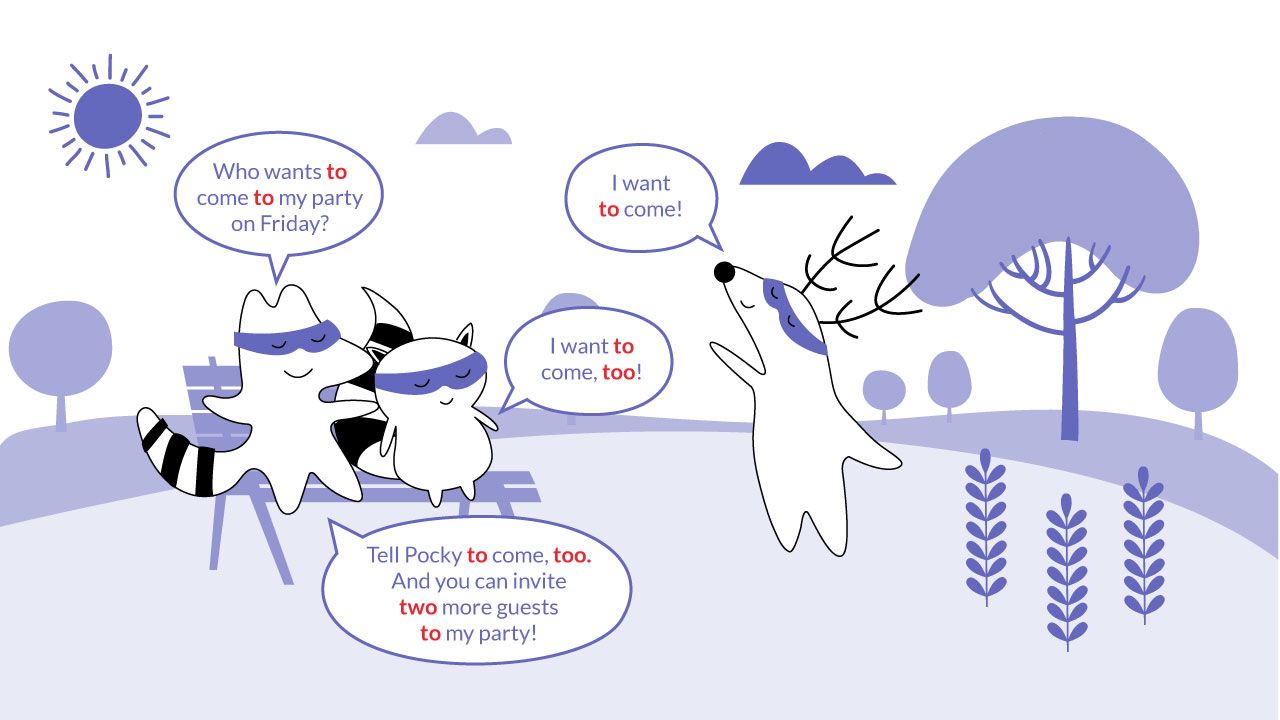
Alot vs. A lot vs. Allot
This one is a bit easier. First of all, although it is a pretty common error to use "alot" instead of "a lot," you should know that there is no such word as "alot". So, if you want to write about a large quantity of something, show that something happens often, or need a synonym for "very much," you should use "a lot":
- I have a lot of hobbies.
- I practice yoga a lot.
- I love dark chocolate a lot.
"Allot,' in its turn, means "to assign as a share or portion" or devote a portion of time, money, or something else to a specific purpose, for example:
- I have a lot of hobbies, but I can allot enough time only for one.
Into vs. In to
Sometimes it can be nearly impossible to tell the difference between the two when you hear them, so it's important to be able to try them out and choose the one that makes the most sense in a sentence. "Into" is a preposition that describes transformation or shows that something is within or inside, for example:
- Hurry up! The coach will turn into a pumpkin at midnight.
- I like organizing my files into labeled folders.
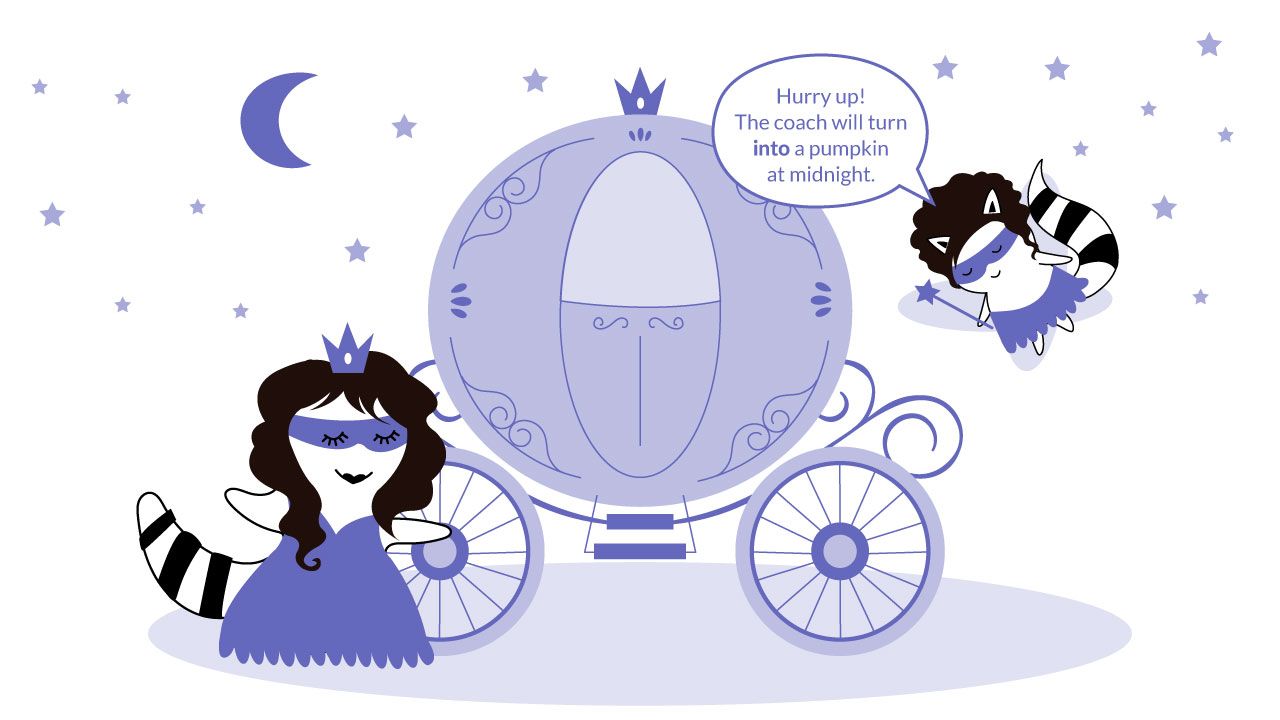
At the same time, "in to" are two separate words that often happen to be located next to each other in a sentence. The confusion arises when "in" is used as a part of the phrasal verb and is located next to a "to" in a sentence, or vice versa. In this case, you need first to determine if "in" or "to" is an independent preposition or a part of a phrasal verb.
Here are the examples of using "in to" in writing:
- He turned his paper in to the teacher. - "turned in" is a phrasal verb
- You'll need to plug your power cord in to the socket. - "plug in" is a phrasal verb
American Spelling vs. British Spelling
Another significant reason for misspellings is the difference between American and British versions of the same words, as people from different places pronounce the exact words differently. And besides indicating different meanings, different spellings are sometimes also used to show differences in pronunciation.
While both pronunciations and spellings are widely accepted, and there is no such thing as a correct one, paying attention to whether you use British English or American English in your writing is important. If you're going to write a formal email or an enrollment essay, it would be best to check which one you should use and stick to it.
However, if there are no strict requirements for the spellings, it doesn't mean you can interchange them in your work. It would still be best to choose either American English or British English and stick to one spelling throughout the whole text to make it sound more professional and intelligent.
Here are a few, most common differences between American and British spelling you should know about to avoid occasional errors, respectively:
- or/-our - flavor/flavour
- er/-re - center/centre
- ense/-ence - license/licence
- og/-ogue - dialog/dialogue
- ize/-ise - realize/realise
- yze/-yse - analyze/analyse
- double “-L” - traveling/travelling
Summary
As you can see, there are many ways in which spelling can be difficult in the English language. The only foolproof way to avoid misspellings is always to be aware of a word's exact meaning.
For example, if you aren't sure whether you should use "where" or "wear" in a sentence, make sure to double-check their meanings in Merriam-Webster or a different dictionary and choose the one that makes the most sense.

If you are looking for additional ways to improve your spelling skills, you may want to download our Langster app. It is full of short stories with audio from native speakers to help you pick up the proper pronunciation. Good luck!







